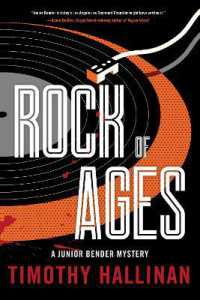- ホーム
- > 洋書
- > 英文書
- > Literary Criticism
Full Description
A major new look at Africa's influence on European culture and how colonization remade Africa in the image of a medieval Europe.
Virgil. Chaucer. Petrarch. These names resonate with many as cornerstones of European culture. Yet, in Atlas's Bones, D. Vance Smith reveals that much of what is claimed as European culture up to the Middle Ages—its great themes in literature, its sources in political thought, its religious beliefs—originated in the writings of African thinkers like Augustine, Fulgentius, and Martianus Capella, or Europeans who thought extensively about Africa. In fact, a third of Virgil's Aeneid takes place in Africa. Francis Petrarch believed his most important achievement was his epic Africa; while Geoffrey Chaucer wrote repeatedly about the figures of Scipio Africanus, actually two different men who defeated and destroyed Carthage.
Smith tells the story of how Europe created a false "medieval" version of Africa to acquire resources and power during the era of imperialism and colonialism. The first half of the book, "Reading Africa," traces Egypt's, Libya's, and Carthage's influence on classical and medieval thinking about Africa, highlighting often ignored literary and legendary traditions, for example, that Alexander the Great named himself the son of an African god. The second part, "Writing Africa," focuses on how the different cultures of the two great African cities—Carthage and Alexandria—shaped modern literary criticism and political theology and examines the cross-influences of modern anthropology, medieval studies, and colonial law.
Atlas's Bones firmly re-establishes the significance of Africa in European intellectual history. It will be essential reading for anyone seeking to understand how much of Africa informs our artistic and cultural world.
Contents
Preface: An Atlas for This Book
Introduction
African History and White Noise 1
"Africa," the Fallout of Metonymy 00
All of Africa 00
I. Ancient and Medieval: Reading Africa
Chapter One. Egypt, the Exception
Africa, the Continent 00
Alexander the Great African 00
The Libyan God of Europe 00
The Fluid Land 00
Egypt in Medieval Europe 00
Moses the African 00
Alexander's African Romance 00
Egyptology's History of Europe 00
Egypt Theory 00
Chapter Two. Africa, Fulcrum of Epic
Mythic Landing: The Iliad, the Argonautica, the Pharsalia, the Aeneid 00
Britain's African Foundations: Geoffrey of Monmouth 00
The African Invention of England 00
Chapter Three. The Specter of Carthage
Carthage the Symptom: Virgil, Silius Italicus, Horace, Freud 00
Carthage and African Identities: Sallust, Tertullian, Augustine 00
Augustine's Scandalous Carthaginian Theory 00
The Dream of Scipio Africanus: Cicero and Macrobius 00
Petrarch's Modern Africa 00
Chaucer and the African 00
Chapter Four. Ghosts of Language: Punic, Lybic, African Myth
The African Tumor in Language 00
Martianus Capella: In the Palace of Myth 00
Fulgentius: Africa's Mythic Language 00
Libyc, the Purest Language 00
The Symbolic Violence of Lost Languages: Bourdieu 00
Our Most Secret Writing: Assia Djebar 00
II. Medieval and Modern: Writing Africa
Chapter Five. Allegory of Two African Cities
Auerbach in Alexandria 00
Auerbach in Carthage 00
Chapter Six. The King's African Bodies
Kantorowicz's African Body 00
Mystical Kings, European and African 00
Anthropology's Divine Kings and Colonial Rule: Leo Frobenius and Max Gluckman 00
Chapter Seven. Kenya's Medieval Charter
The Feudal Metaphor 00
Medieval Land Law in Africa 00
How Oxford Medievalists Ruled the World 00
Independent Feudalism 00
Kenyatta and Malinowski Imagine Land 00
Ngũgĩ wa Thiong'o: Land before Time 00
Chapter Eight Fanon Outside History: Manicheism, Augustine, and Hegel
Which Manicheism? 00
Manicheism and Dialectic 00
Struggling with Augustine, Then and Now 00
Chapter Nine Zimbabwe and the Fear of the Medieval
The Specter of Carthage, Again 00
Picturesque Archaeology 00
Barbarian Invasions: Rhodes's Gibbon 00
The Inconvenience of the Medieval 00
Coda The New Divine Kings
Acknowledgments
Notes
Index
-
- 洋書
- Rock of Ages
-

- 洋書電子書籍
- Sustainable Wireles…






